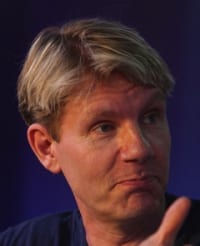The federal government has withdrawn its offer – made under former Prime Minister Tony Abbott – to spend $4 million on the establishment of a research centre at an Australian university, headed by Danish climate change “contrarian” Bjorn Lomborg.
The news was delivered in a round-about fashion by education minister Simon Birmingham, in comments made to the  education estimates hearing on Wednesday.
education estimates hearing on Wednesday.
Senator Birmingham said his predecessor, Christopher Pyne, had made the decision that the “proposal was unlikely to enjoy success, and that the funds could be better utilised elsewhere”, as one of his last acts as education minister.
Greens Senator, Robert Simms, was keen to clarify…
Simms: So we can say today with clarity that that is the end of the Lomborg matter. It’s not going to be hosted here in Australia?
Birmingham: If any Australian university wants to engage with Bjorn Lomborg, they should feel absolutely free to do so… Certainly a specific incentive from the government for such an institute is no longer available.
The decision to withdraw said specific incentive – regarded as one of the various “Captain’s Picks” that helped lead to Abbott’s downfall as PM – was welcomed by the Greens, with Simms later describing it as “great news for the academic integrity of (Australia’s) universities.”
Indeed, in March, the University of Western Australia pulled out of the deal to create a “consensus centre” run by Lomborg, after a significant backlash from staff. Adelaide’s Flinders University had since expressed interest.
As we reported here, one of the few groups to come out in support of the project was Australia’s nuclear lobby; no doubt due to Lomborg’s preference for nuclear energy over the deployment of renewable energy technology in its current forms.
In response to the news that the government funds have now been withdrawn, a spokesman for Lomborg’s Copenhagen Consensus Centre said it was disappointing.
“Those who used the announcement of Australia Consensus as a political football had no interest in our record of ten years’ work on development issues, or our work with hundreds of world-class economists and Nobel laureates,” the spokesman said.
“Australia could have played a leadership role in setting global development priorities. It is a pity for Australian researchers and civil society that won’t be the case.”






